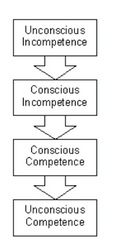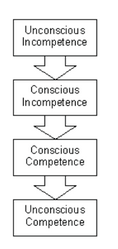I always like these small differences, but I think they are very useful when considering learning and how it might be created and the stage of the change journey the learner is on.
For example if you are creating a piece of learning you may need to consider if the person has already realised they are competent or not competent at doing something. You may want to help them through this realisaion from not being to becoming competent by having a quizz initially for the learner to assess their knowledge.
Then as they work their way through the learning, you might have different activities to test the various levels of competency, hence strengthening the learning.
But we should remember that this should not be the end of the learning journey but the begining, until they have reached the stage of unconscious competence. Effectively doing without thinking.

The post Unconscious Incompetence to Conscious Competence appeared first on eLearning.
I always like these small differences, but I think they are very useful when considering learning and how it might be created and the stage of the change journey the learner is on. For example if you are creating a piece of learning you may need to consider if the person has already realised they are competent or not competent at doing something. You may want to help them through this realisaion from not being to becoming competent by having
The post Unconscious Incompetence to Conscious Competence appeared first on eLearning.Read MoreDiscussion, Instructional Design, soft skills and compliance training

